10 Best Music Theory Courses for 2025: Read and Interpret Music
Explore the building blocks of music in our guide to learning music theory. From notes to harmonies, discover the essentials to elevate your musical understanding.
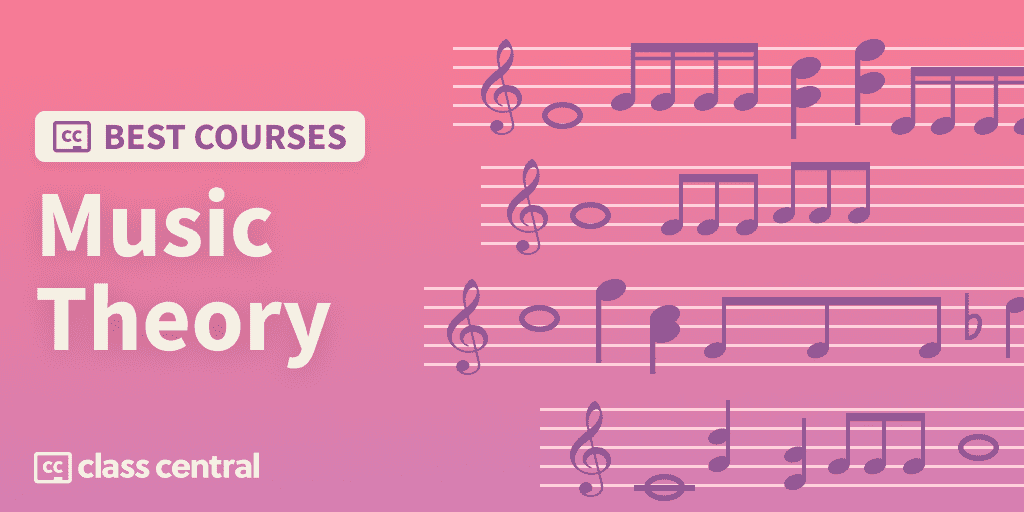
When I took guitar and singing lessons as a girl, I was taught music theory. Some family friends were astounded that I could actually read the notes on the page. My father was delighted. He could not read music, but played the accordion and the harmonica by ear.
Music theory includes the basics of music notation as well as the study of historical music and composers. For this Best Courses Guide (BCG), I searched the Class Central catalog and the internet to identify the top online music theory courses. Courses in this BCG can teach you beginner music so you can start playing an instrument, create better recorded tracks, or understand all the components of written music, right up to acing your Associated Board of the Royal Schools of Music (ABRSM) or Advanced Placement (AP) music exam.
Click on the shortcuts for more details:
Here are our top picks
Stats
- 3 courses are free or free-to-audit and 7 are paid
- 8 courses offer a certificate of completion
- The Music Theory subject has more than 1,000 courses and is followed by over 10K learners on Class Central
- The most featured provider is Udemy with 6 courses.
Best Music Theory Course with Free Certificate (The Open University)

Are you a beginner who’s keen to understand how to read music? An introduction to music theory by The Open University is an ideal starting point. This free text-based course is perfect for beginners, as it covers the fundamental aspects of music theory, including staves, clefs, rhythmic and pitch values, and time signatures. It’s designed to be on par with Grades 1–3 of the Associated Board of the Royal Schools of Music (ABRSM) theory exams. You’ll have the opportunity to test your understanding through simple multiple-choice questions as you progress.
It even includes links to various sites to practice listening and improve your understanding.
What you’ll learn:
- The basics of music staves, clefs, and the great staff, including middle C and ledger lines
- How to write and read notes, and identify note names on both the treble and bass staves
- Understanding of rhythm and metre, time values, triplets, time signatures, and the use of dots and ties
- Grouping and beaming notes, and the values and grouping of rests in both simple and compound time
- The scales of C major, G major, F major, and their relative minor scales, along with key signatures with sharps and flats
- Accidentals, degrees of the scale, intervals, and the circle of fifths
- The basics of harmony, focusing on the triad, and an introduction to performance directions in scores.
“Very helpful course. Even better as it is free … I was finding YouTube music theory videos more confusing than helpful, but this course really helped.” – SKS, OpenLearn learner.
| Provider | OpenLearn |
| University | The Open University |
| Time Commitment | 8 hours |
| Rating | 4.2/5.0 (65) |
| Cost | Free |
| Certificate | Free |
Best Music Theory Course with Downloadable Resources (Jonathan Peters)
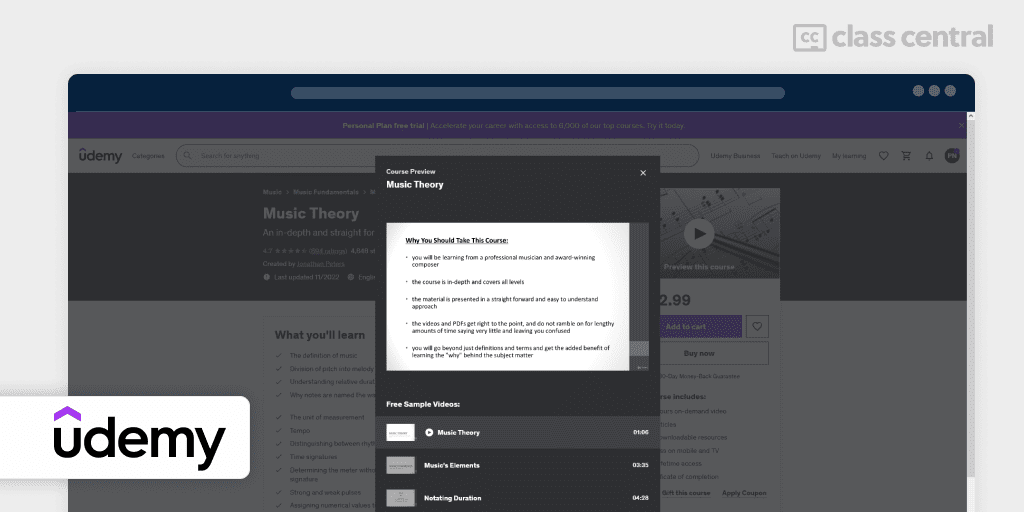
Music Theory by Jonathan Peters is perfect for anyone who wants to delve deep into the mechanics of music, either a beginner or someone with some knowledge looking to expand your understanding. It’s comprehensive, covering everything from the basics of rhythm and pitch to the complexities of scales, intervals, and chord progressions. There are no special requirements to take this course, which is designed to be straightforward, so you can grasp the concepts without getting lost in jargon.
In this course, you will learn:
- The fundamentals of music, including rhythm, pitch, melody, and harmony
- How to read and understand rhythmic notation, time signatures, and the division of beats
- The intricacies of pitch, including the staff, clefs, ledger lines, and the musical alphabet
- The construction and identification of scales, intervals, and chords on both the keyboard and staff
- The historical and mathematical background of music theory concepts
- The principles of tonal music, including key signatures, the circle of fifths, and the major and minor scales
- Advanced topics such as chord inversions, chord progressions, and the different types of cadences
- An overview of tuning systems, the harmonic series, and the periods of Western art music.
This course includes 112 lectures, over 350 diagrams, over 90 audio examples, 369 memory questions, 45 on-line quizzes, nearly 1,000 quiz questions, plus exercises, experiments and downloadable music apps.
“It is very detailed, simple to learn and love the quizzes at the end — I love this, and I am learning so so much” – Natasha Quiza A., Udemy learner.
| Provider | Udemy |
| Instructor | Jonathan Peters |
| Time Commitment | 5 hours |
| Enrollment | 4.6K |
| Rating | 4.7/5.0 (1024) |
| Cost | Paid |
| Certificate | Paid |
More Great Music Theory Courses for Beginners (Jason Allen)
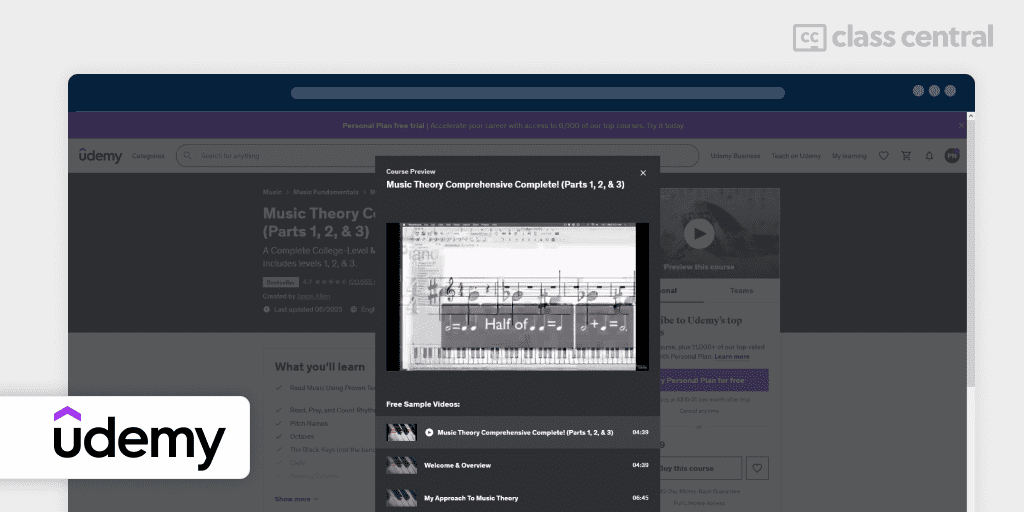
Jason Allen is a professional musician, top-rated Udemy instructor, and university professor who has designed Music Theory Comprehensive Complete! (Parts 1, 2, & 3) based on the syllabus he uses for his college classes.
The first section (Parts 1, 2, & 3) is suitable for beginners and serves as a complete guide to understanding music theory. The course is comprehensive and does not require any special prerequisites. Dr Allen’s approach minimizes memorization by focusing on understanding the underlying concepts of music theory, enabling you to learn efficiently and effectively. This course is a one-stop-shop for all your music theory needs, providing a wealth of knowledge that is both practical and applicable to real-life music scenarios.
In this course, you will learn to:
- Read and understand all symbols on a music score, including notes, rhythms, and accidentals
- Master the elements of the score, such as pitch names, classes, octaves, clefs, intervals, and key signatures
- Analyze and write melodies using major and minor scales, and understand the concept of being “in key”
- Build and analyze chords, including triads, seventh chords, and their inversions, and use them in songwriting and composition
- Utilize the Circle of Fifths, understand scale degree names, and work with compound meters and various rhythmic patterns
- Explore diatonic chord progressions, the use of minor keys, and the characteristics of harmonic and melodic minor scales.
Other courses by Jason Allen (also known as J. Anthony Allen):
Music Theory Comprehensive Complete: Part 4, 5, & 6 (Udemy, 10 hours)
Music Theory Comprehensive Complete: Part 7, 8, & 9 (Udemy, 9-10 hours)
Music Theory Comprehensive Complete: Part 10, 11, & 12 (Udemy, 8-9 hours)
Music Theory Comprehensive: Part 1 – How To Read Music (Skillshare, 3-4 hours)
Music Theory Comprehensive: Part 2 – Chords, Scales, & Keys (Skillshare, 5 hours)
Music Theory for Electronic Music COMPLETE: Parts 1, 2, & 3 (Udemy, 12-13 hours)
“Has a wonderful way of imparting information and making it easy to understand. Extremely patient, with a great voice. I can’t wait to take more courses from him!” – Randy Lee R., Udemy learner.
| Provider | Udemy |
| Instructor | Jason Allen |
| Time Commitment | 12 hours |
| Enrollment | 121.5K |
| Rating | 4.7/5.0 (22.0K) |
| Cost | Paid |
| Certificate | Paid |
Also Great Short Beginner Music Theory Course (Joe Parys and Erich Bailey)

If your time is limited but you want an understanding of how music is written down, take a look at Learn To Read & Write Music – Go From Beginner To Advanced. Joe Parys and Erich Bailey offer a comprehensive journey through the world of music notation. You’ll start with the basics, such as understanding the staff and rhythms, and progress to more advanced concepts like key changes and complex notation. The instructors bring their specialized knowledge to help you transition from a novice to a proficient reader and writer of music.
In this course, you will learn to:
- Read and write music, starting from the basics to advanced levels
- Understand and apply concepts like the staff, rhythms, key signatures, and the treble clef
- Recognize and notate chords, and delve into time signatures and dynamics.
“As an absolute beginner I found the course clear, organized, and the lessons presented in the perfect order…” – Alexander J., Udemy learner.
| Provider | Udemy |
| Instructor | Joe Parys and Erich Bailey |
| Time Commitment | 2-3 hours |
| Enrollment | 8.4K |
| Rating | 4.7/5.0 (222) |
| Cost | Paid |
| Certificate | Paid |
Best Music Theory Course for Piano Players (Musicians Inspired)
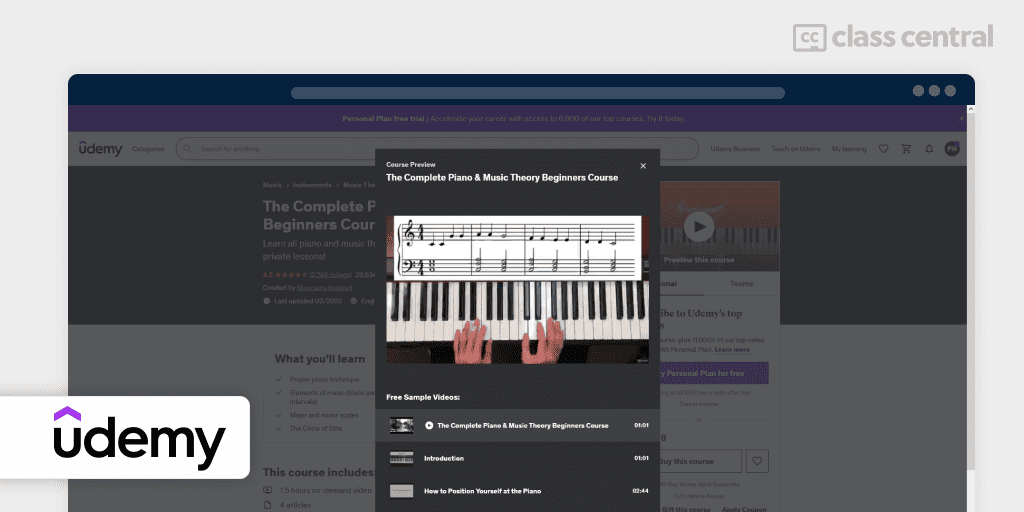
Ideal for beginners and those with some gaps in their music theory knowledge, The Complete Piano & Music Theory Beginners Course is a fast track to mastering the basics of piano and music theory. This course is perfect if you’ve always wanted to play the piano but didn’t know where to start, or if you’re looking to quickly fill in any theoretical knowledge you might be missing. It’s designed to be compact and easy to follow, with a clear and logical structure that eliminates any unnecessary fluff. You’ll be learning from a structured series of lectures aimed at laying out concepts in a way that’s easy to grasp. By the end of this course, you’ll have a solid foundation to pursue more advanced studies, whether that’s with a private teacher or through more advanced courses.
Here’s what you’ll learn from this course:
- Proper piano technique to start playing correctly
- How to read sheet music and understand the notes on a page
- The elements of music, including black and white notes, intervals, chords, and scales
- Major, minor, diminished, and augmented chords, as well as major and minor scales
- Rhythm fundamentals and rhythmic subdivision
- Mastery of the Circle of 5ths and knowledge of the 12 major keys and their relative minors.
“100% recommended. Although I have good piano basis there were a few gaps that managed to fill with this course. Great content. Straight to the point and really easy to follow.” – Andres E., Udemy learner.
| Provider | Udemy |
| Institution | Musicians Inspired |
| Time Commitment | 1-2 hours |
| Enrollment | 23.3K |
| Class Central Rating | 4.4/5.0 (2.8K) |
| Cost | Paid |
| Certificate | Paid |
Best Music Theory Course for Guitar Players (Henry Olsen)
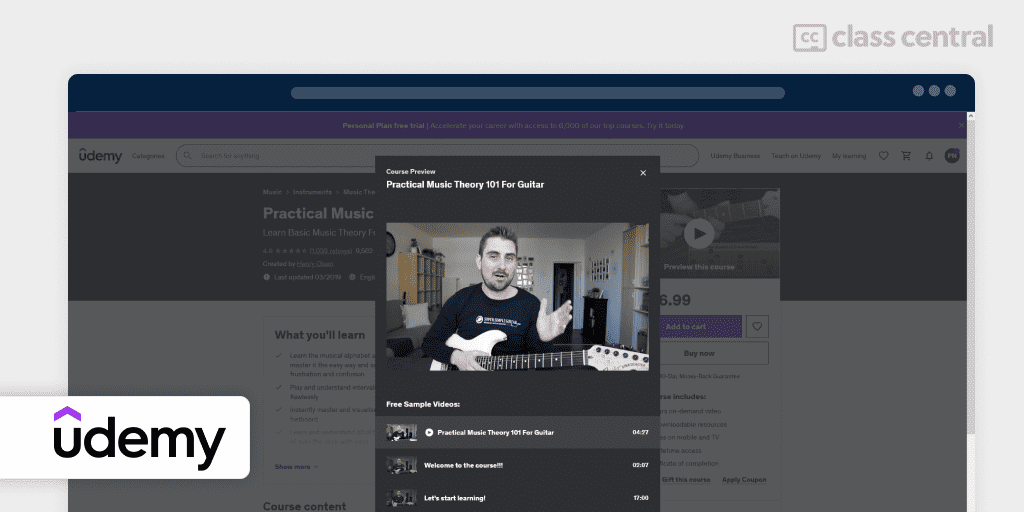
Practical Music Theory 101 For Guitar is ideal for guitar players who wish to deepen their understanding of music theory and master the fretboard. It is particularly suitable for beginners who are looking to save years of potential frustration by learning the musical alphabet, chord building, and key mastery the easy way. The course covers intervals, scales, and chord types plus visualizing the fretboard and understanding musical keys. Instructor Henry Olsen brings eight years of guitar teaching experience and a high student satisfaction rating to this expertly crafted course.
By enrolling in this course, you will:
- Gain a solid grasp of the musical alphabet and learn to navigate the fretboard with confidence
- Understand how to construct various chord types, including sus2, sus4, 7th, minor 7th, and more
- Master playing in different keys and learn the relationship between scales, chords, and intervals
- Discover practical formulas and shortcuts to accelerate your learning process
- Access in-video scales, charts, and a downloadable 42-page picture chord book for easy reference.
This course is also available on Skillshare.
“I’ve been just covering songs on the guitar for years but this is my first foray into learning the theory behind what I’ve been playing. So far this course has helped everything really click and it’s ignited a passion to keep going!” – Joshua S., Udemy learner.
| Provider | Udemy |
| Instructor | Henry Olsen |
| Time Commitment | 5 hours |
| Enrollment | 10.1K |
| Rating | 4.6/5.0 (1.1K) |
| Cost | Paid |
| Certificate | Paid |
Best Course for Electronic Music Producers (Digital Music Masters)
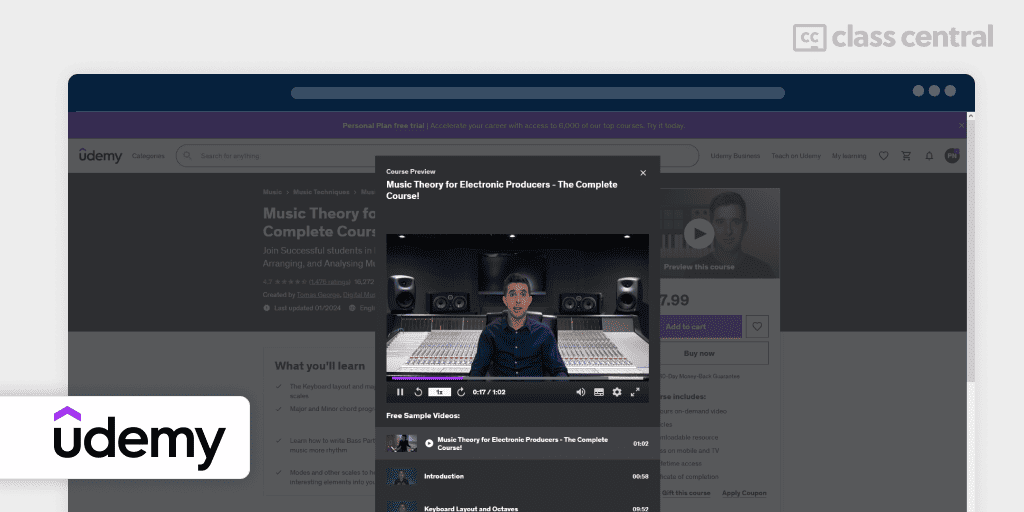
Are you an electronic music producer who wants to deepen your understanding of music theory to enhance your songwriting and production skills? Music Theory for Electronic Producers – The Complete Course! is for you. If you have no prior knowledge of music theory or maybe looking to improve some basic understanding, this course will cater to your needs.
The instructor, Tomas George, brings a wealth of knowledge to the table with a MMus Masters Degree in Music Production and a BA(Hons) Degree in Music Composition. He’s been writing music for over 10 years. He is also recognized for creating some of the world’s most popular music production courses, with a large student base and numerous high-rated reviews. His expertise is directly relevant to the topic of music theory in the context of electronic music production.
In this course, you will learn:
- The essentials of music theory, including major and minor scales, chords, inversions, and chord progressions
- Techniques for writing memorable melodies, bass parts, and adding rhythm to your music
- Advanced concepts like modes, song analysis, and various scales to bring unique elements to your tracks
- Practical songwriting skills, such as creating a song from a drum beat, chord progression, or melody
- How to write harmonies and work out keys and scales for your music.
“Very thorough. I was getting nowhere by trying to learn music theory from random YT videos. So I decided to finally take a detailed course. That was a good choice, and you will make the same good choice by choosing this course.” – Martin K., Udemy learner.
| Provider | Udemy |
| Institution | Digital Music Masters |
| Instructor | Tomas George |
| Time Commitment | 8-9 hours |
| Enrollment | 17.5K |
| Rating | 4.7/5.0 (1.6K) |
| Cost | Paid |
| Certificate | Paid |
Best Intermediate Music Theory Course (Berklee College of Music)
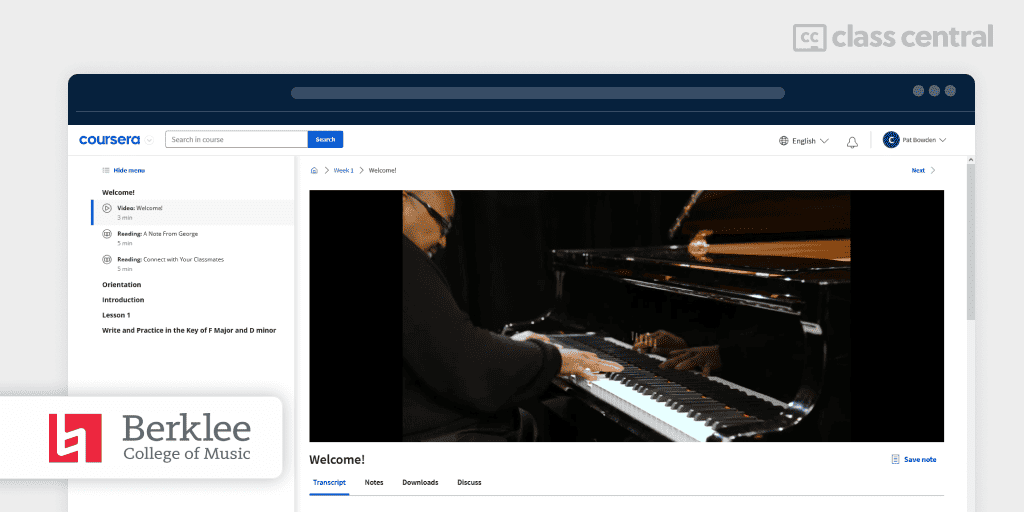
Musicianship: Chord Charts, Diatonic Chords, and Minor Keys is part of the Developing Your Musicianship Specialization by Berklee College of Music. If you’ve already dipped your toes into the basics of music theory or have completed the first course in the Developing Your Musicianship series, this course is the perfect next step for you. It is taught by Professor George W. Russell, Jr., and is designed for intermediate learners looking to deepen their understanding of harmony and ear training. You’ll explore new key signatures, delve into minor tonalities, and learn how to construct 7th chords and common chord progressions. The course is comprehensive in its approach to building upon your musicianship skills, culminating in a practical assignment where you’ll compose and perform your own music.
During this course, you will:
- Gain a deeper understanding of key signatures and minor tonalities, including how to build and recognize 7th chords.
- Develop your ear training to identify minor intervals, 7th chords, and the major pentatonic scale.
- Learn to construct melodies using the major pentatonic scale and create chord progressions.
- Apply your knowledge by composing and performing an 8-measure composition using popular chord progressions and the major pentatonic scale.
“Excellent class taught by an engaging and knowledgeable teacher. The Berklee classes are the best music classes I have found on Coursera.” – JB, Coursera learner (Review of Musicianship: Chord Charts, Diatonic Chords, and Minor Keys).
| Provider | Coursera |
| University | Berklee College of Music |
| Instructor | George W. Russell, Jr. |
| Time Commitment | 12 hours |
| Enrollment | 35.5K |
| Rating | 4.9/5.0 (550) |
| Cost | Free audit |
| Certificate | Paid |
Best AP Music Theory Exam Prep Course (Study.com)
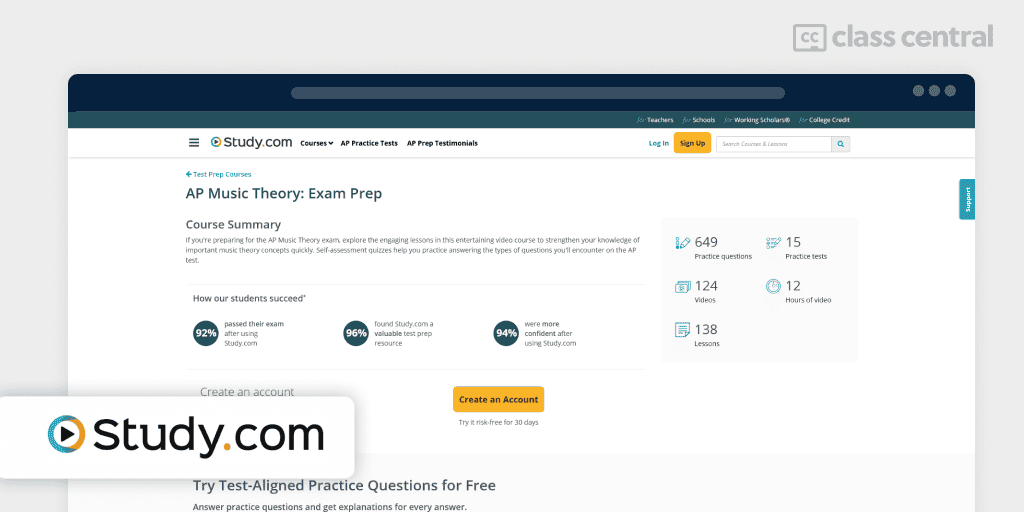
AP Music Theory: Exam Prep is specifically designed for students who are gearing up for the Advanced Placement (AP) Music Theory exam in the USA. It’s an ideal fit if you’re looking to solidify your understanding of music theory concepts in a fun and engaging way. The course covers everything from the fundamentals of music to voice leading and performance terms. It’s suitable for beginners who are new to music theory, as well as those who want to refresh their knowledge before the exam. The use of self-assessment quizzes throughout the course ensures that you can practice and prepare effectively for the types of questions you’ll face on the actual AP test.
You will learn:
- The types of questions to expect on the AP Music Theory exam
- Fundamental music theory concepts, including rhythm, meter, scales, keys, and modes
- Aural skills and how to apply them in music theory
- Techniques for melodic and harmonic composition
- The use of intervals, triads, seventh chords, and nonharmonic tones
- How to analyze phrases, forms, and texture in music
- Voice leading principles and their application in various songs and genres
- A comprehensive set of flashcards to aid in memorization and test preparation.
| Provider | Study.com |
| Time Commitment | 18 hours |
| Practice Questions | Yes (649 questions) |
| Cost | Paid |
| Certificate | Not available |
Best Free Music Course for ABRSM Exam Prep (Music Matters)
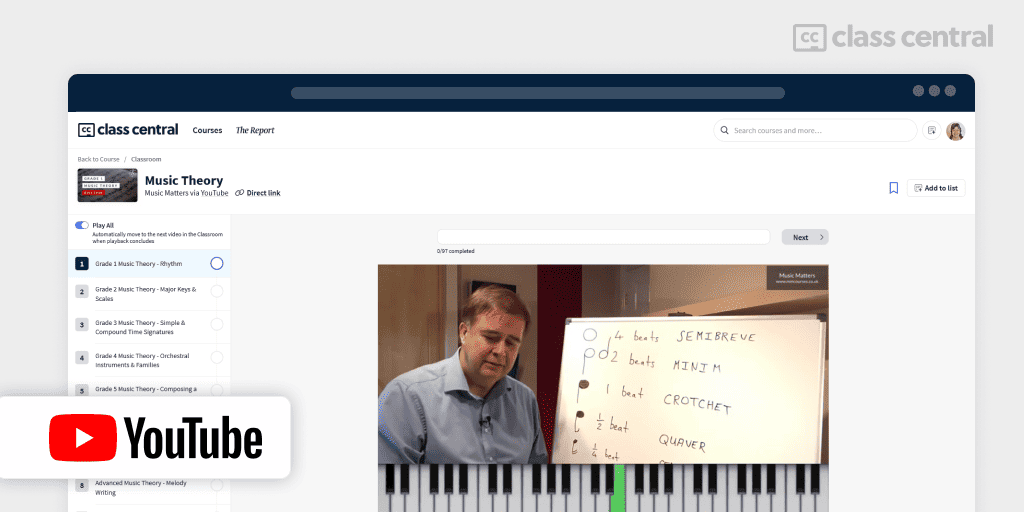
Are you preparing to sit an Associated Board of the Royal Schools of Music (ABRSM) exam? Music Theory is ideal for anyone looking to deepen their understanding of music, particularly those preparing for ABRSM exams, which are available in 93 countries. The course starts with Grade 1 foundational topics and moves through to advanced music theory concepts for higher grade exams.
In this course, you will learn:
- The fundamentals of music theory, including rhythm, major and minor keys, and scales
- How to read and write music, including understanding clefs and ledger lines
- Advanced concepts such as harmony, melody writing, and figured bass
- Practical skills like transposing melodies, harmonizing scales, and identifying chords
- Theoretical knowledge including the circle of fifths, cadences, and modulation techniques
- Tips and advice for music theory exams.
“It was really an educative and very understandable one. Though it’s a very long explanatory video but with much benefits.” – Olukoju Oluwole Emmanuel, Class Central user.
| Provider | YouTube |
| Channel | Music Matters |
| Time Commitment | 19 hours |
| Views | 736K |
| Rating | 5.0/5.0 (2) |
| Cost | Free |
| Certificate | Not available |
Why You Should Trust Us
Class Central, a Tripadvisor for online education, has helped 100 million learners find their next course. We’ve been combing through online education for more than a decade to aggregate a catalog of 250,000 online courses and 250,000 reviews written by our users. And we’re online learners ourselves: combined, the Class Central team has completed over 400 online courses, including online degrees. I’ve personally completed over 200 online courses in a variety of topics.
How We Made Our Picks and Tested Them
Trying to find “the best” can be daunting, even for those of us who live and breathe online courses. Here’s how I approached this task.
First, I combed through Class Central’s Catalog and the internet to find a variety of free and paid open courses, some with certificates. You don’t need to pay for private lessons to learn about music theory.
When choosing courses, I considered the following factors:
- Renowned Institutions: I looked for recognized institutions in music
- Instructor experience: I sought instructors with extensive experience in music and engaging presentation styles
- Popularity: I checked numbers of enrollments and views to find popular courses
- Course content: I examined courses that covered a range of topics and presentation styles, including the basics and more advanced topics. I watched some course videos to sample courses I hadn’t already taken
- Learner reviews: I read learner reviews (when available) to get a sense of the quality of each course, leveraging the Class Central database with its thousands of course ratings and reviews written by our users as well as available course provider reviews.
- Then, I defined the scope for these recommendations. A music theory course can approach the subject in various ways, so I chose top courses from a range of aspects.
Ultimately, I used a combination of data and my own judgment to make these picks. I’m confident these recommendations will be a reliable way to learn the theory of music.








